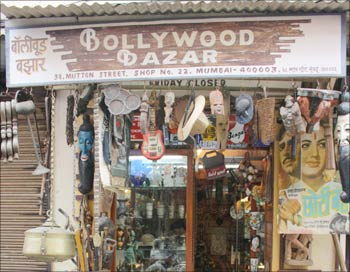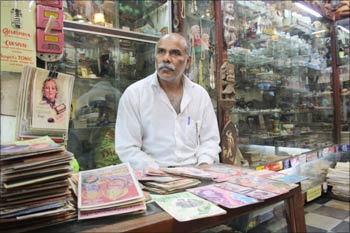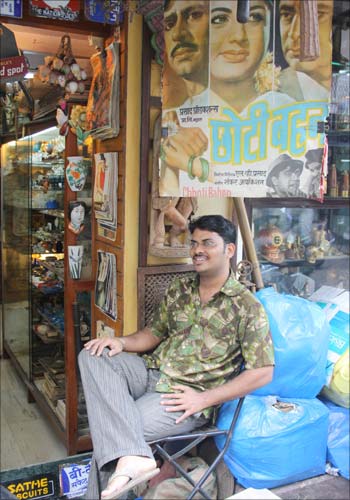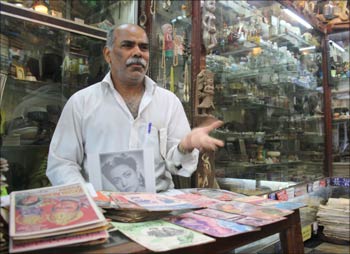Photographs: Hitesh Harisinghani Syed Firdaus Ashraf in Mumbai
Tucked into the bylanes of South Mumbai, in the unlikely down-market area of Chor Bazaar, is Bollywood's one-stop shop for everything.
The shop does not look like a grand film set and neither does its owner Shahid Mansoori look as sophisticated as Karan Johar. Yet, this is the place rich and famous filmmakers approach to make their movies look spectacular.
Mansoori owns an antique shop with rare pieces of art called Bollywood Bazar. So when Ashutosh Gowariker needed armour for Jodhaa Akbar, this is the shop that supplied it. When Farah Khan wanted to make a 1970s-styled film Om Shanti Om, it was Mansoori who helped out.
Mansoori is also an avid film poster collector, a passion that started when he was a child. And it was Dara Singh, who got Mansoori interested. As a child, Mansoori was obsessed with wrestling. When Dara Singh joined films, Mansoori would tear his film posters off the streets and add them to his collection. Gradually, he got interested in the world of cinema and widened his collection.
And this culminated in the Bollywood Bazar.
'Even if you give me Rs 1 crore for that, I will not sell Aalam Ara booklet'
Image: Shahid Mansoori"I loved Dara Singh. I remember the first time I tore his film poster from a wall on the street. It was of the film, King Kong," Mansoori says.
"My family didn't know [of my obsession], I used to do it secretly," he adds. "In those days, there was no television. The only entertainment we had was roadside wrestling. I used to love watching that. And Dara Singh's films became my all-time favourite. When I grew up, I started wrestling on a local level."
Mansoori started the shop in the late 1970s when he realised he had many prized collections, including a booklet of the first Hindi talkie film, Aalam Ara (1931).
"Even if you give me Rs 1 crore for that, I will not sell it," Mansoori smiles.
Later, he got his son Wahid to help him out in the business.
To keep the antique items safe, the Mansooris spray pesticides from time to time.
'All the production houses know the kind of stuff we have'
Image: Wahid Mansoori"All the production houses know our address and the kind of stuff we have," Wahid says. "Their production guys come regularly to our place."
The distance does not deter productions houses, as they have to travel the length of Mumbai to reach the shop. And nor does the locality. It does not matter that the shop is in Chor Bazaar, the literal meaning of which is 'thief's market'. But Wahid clarifies: "There are no thieves in Chor Bazaar. You will get a bill when you shop."
He goes on to explain how the market got its name. "The market was very popular 100 years ago. There used to be lot of hustle-bustle and noise. The first name given to it was Shor Bazaar [Noisy Market]. But that got corrupted to Chor Bazaar."
'One of my favourite actors was Raaj Kumar'
Image: Shahid MansooriDid he ever get a chance to meet any actors, especially the stars of yesterday? "I used to meet many of them," Mansoori says. "But now many of them have passed away. One of my favourite actors was Raaj Kumar. He had a very unique style of talking. I loved it.
"If you watch Raaj Kumar's films, he will always call the villain 'Aap' and say 'Aadab'. He will never use derogatory words. That was the beauty of his style. He was out of this world," he says.
"I feel sad that today's generation doesn't bother about their parents' work," he continues. "They do not preserve it. I'm preserving it, and only because it's my livelihood. I bought these posters very cheaply 20 years ago, as nobody bothered to even frame them. Today's generation is either too lazy or just bothered about selling their parents' property and making money. Some of them have also migrated and not bothered to carry on their family legacy. It makes me sad."
Mansoori plans to take his work overseas. "Wahid is going to Paris next month to exhibit our film posters. The foreigners are very keen to know more about our business," he says.





Comment
article